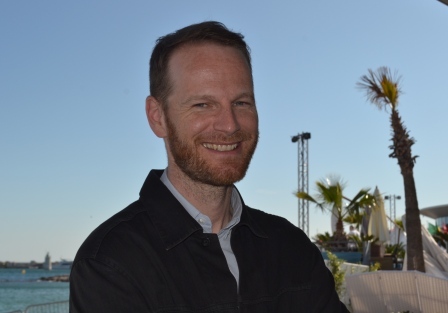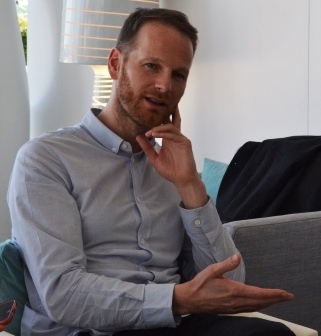Joachim Trier's intriguing Louder Than Bombs opens with the birth of a baby, an ecstatic young mother and a thrilled young father: a scene foretelling that, very soon, the concept of the happy family will be put in question. Indeed, the story quickly shifts and becomes a quiet study of the uncomfortable "chasms" that lurk under the surface of family togetherness. The young father returns for a visit to his family home, where his own father and little brother live. But no mother. She, a famed war journalist, is conspicuously absent, and only exists in flashback. She has been dead for years, a death that becomes a mystery in the film. Her absent presence haunts and puts a pall over each of the family members. The father, a former TV actor (played by Gabriel Byrne), looks like a rock has stunned him. The adolescent boy is broodingly angry. The older brother, the new father, has a hard time returning to his wife and newborn.
The sense of mystery pervades the structure of the film as well. We are never sure what or whom the film is about: the elder father, or one of the two sons, or perhaps even the dead photojournalist, played in the flashbacks by an elusive Isabelle Huppert. The camera tracks first one character and then another, not privileging any one in particular. It enters into the mother's troubled dreams; it follows the father's uneasy footsteps; it comes upon the two sons in their room discussing their mother. Yet one character does eventually take central stage: the adolescent boy who refuses to speak to his father, and who looks sullen most of the time. We gradually connect to him, as he becomes, at the end, the main protagonist, an endearing adolescent who has a crush on a girl. The highlight of the film is a walk home from a high school party, with this drunken girl stumbling in her heels as the boy tries to help her. The boy blossoms with the promise of love: there seems to have been an evolution in this family.
But more than about promise and evolution, this film seems to be about the heaviness of the unsaid, and the construction of identity. The secrets of the family weigh on the innocent of the new generation, without their full awareness of what these secrets are. The infant who began the movie is, ultimately, the Ur-protagonist. Soon he too will bear the traces of emotional baggage that cannot be spoken.
Louder than Bombs is an intellectually curious and quiet film. I met with director Joachim Trier to discuss. The director, a lively brainy young Norwegian man, with three successful feature films under his belt, spoke with ease about the main drive of his film: that to challenge conventional narrative ways of telling a story.
Is this film about the family secrets that influence identity?
The film deals with the idea of development within a family, with the issue of togetherness, the need for separation and self, the role of memory. It is abstract, but we can relate to these issues in our life. I grew up with lots of American east coast shows: Kramer vs Kramer, Ordinary People, The Breakfast Club, all of which depict families in suburbs with autumn leaves. I was curious how to do a modern version of this kind of film, one which deals with social interaction and the modern family.
There is evolution in this film?
Mine is a hopeful film: we are always re-evaluating ourselves as human beings, we are destabilized [by our past] , but memories change. The grief in this family is static, but the re-evaluation of memories, which may be a quite devastating process, can [ultimately] be very helpful...
How did you create the story?
My co-writer and I are old friends. We spent a year just talking. The story grows and grows. We don't start with a plot line. I am really bad at the process of nailing the plot to a sentence. We wanted to have a more humanistic kind of storyteller. We didn't want a protagonist and an antagonist, like in the classic screenplay structure. We wanted to jump between perspectives, to do a polyphonic story.
So there is no one central character?
I test screen my film a lot. Some spectators emote more with Isabelle, some with Gabriel. That's the film. I did not turn up the volume of this character or that one. It's a matter of narrative versus character. I want to challenge the standard idea that you have to have one central character in the story, and that lack of clarity is a bad thing. I try to keep the difference [and balance] between denotation and connotation: giving just enough clarity to help the spectator follow the story, and then leaving other images ambiguous. Certain things need to be understood for other things to be open to interpretation.
Can you give me an example of a "connotative" image in your film?
Yes, the long close up of Isabelle's face. She looking straight at the audience. What does that mean? I chose Isabelle Huppert for the mother because the genius of her acting is her ability to let you in and let you out. She plays upon absence.


